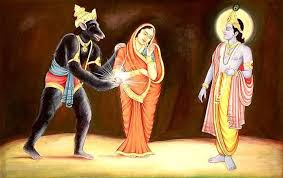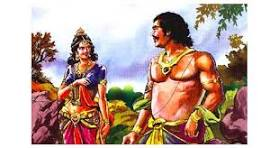ZARAA (JARAA)
Zaraa
(JARAA) was a harpy (Raakshasi) . Though she was a harpy she
loved human beings. It is believed that if the picture of Zaraa and her children
is placed in the house and venerated, there will be no haunting of any other
'kinds of demons. The figure of Zaraa was sculptured on the wall of the Palace
of Bruhadratha, the King of Magadha, and was being worshipped, because the King
worshipped her, she had been looking forward to an opportunity to reward the
King.
Brhadratha
had married two daughters of the King of Kasi. They were twin sisters. For a
long-time they remained childless. The King was very sorry, and went to the
forest with his wives. He saw the hermit Kakshivan or Chandakausika, the son of
Gautama and requested that a son should be born to him.
The
hermit was sitting in meditation under a mango tree and a mango fell on his
lap. The hermit took it and by prayer and meditation he invoked divine power
into it and gave it to the King. The King divided it into two and gave it to
his wives. The queens became pregnant and the three returned joyously. In due
course both delivered. But each of them gave birth to only half of a child. The
horrified queens took the uncouth figures outside the palace and left them
there. Zaraa was watching this. She ran to the spot and placed the two portions
together. Instantly it became a child of proper form. Hearing the cry of the
child the mothers, came out.
Zaraa
appeared there and placed the child before the King Brhadratha. As desired by Jara the child was named Zaraasandha
(Jarasandha) because he was joined together by Zaraa. This child grew up and
became the notorious King Jarasandha of Magadha.
It
is mentioned in Mahabharata, Drona Parva, Chapter 182, Stanza 12 that when
Arjuna fought with Jarasandha, this harpy Zaraa had been staying in the weapon
of Jarasandha and was killed in that fight.
(I'm participating in #BlogchatterA2Z and hyperlink https://www.theblogchatter.com)




























